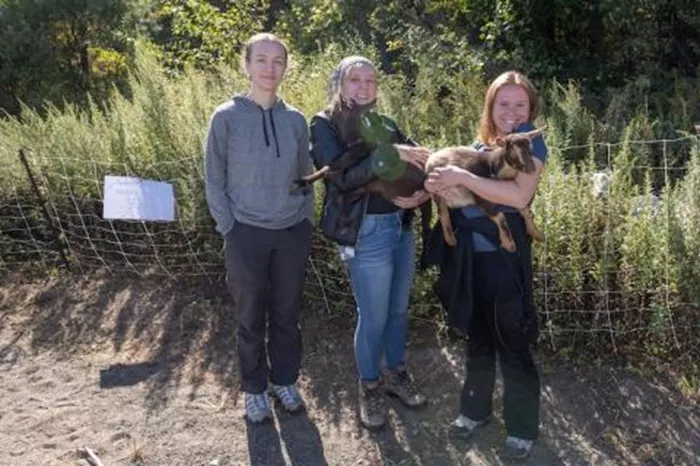Three Westfield State University environmental science majors have come up with an innovative plan to tackle invasive plant species on campus. For their Senior Capstone Project, students Sophia Milko, Lindsey Dion, and Abbey Majka are using goats to clear the area near South Lot, applying a centuries-old method called “goatscaping.” This approach involves using goats to eat invasive plants that threaten local ecosystems.
Milko’s inspiration for the project comes from her childhood on Nightingale Acres in Central Massachusetts, where her family used goats to manage unwanted plants like poison ivy. She’s now using her experience in both environmental science and working with animals to target invasive species on campus, particularly Oriental Bittersweet, a fast-growing vine that can choke trees.
“We’re seeing a lot of Oriental Bittersweet in our area,” Milko said. “It’s hard to remove because it grows back so fast, so we’re testing whether goats can help by eating the plant and its seeds, making it more difficult for the plant to return.”
Goats, with their four-chamber stomachs, are well-suited for this task. They can digest a wide variety of plants, making them one of the most cost-effective and environmentally friendly ways to deal with invasive species. Since many invasive plants reduce biodiversity and develop strong defenses, goats provide a natural solution that doesn’t harm the animals.
Invasive plants can be introduced through both accidental and deliberate means, often brought from other countries. Majka noted that species like Japanese Knotweed were introduced for ornamental purposes, but with no natural predators in the local ecosystem, they quickly spread out of control. “These plants evolve to compete aggressively with others, and soon they dominate the environment,” she explained.
For their project, the students partnered with Cindy Williams, a Westfield State alumna and owner of Goatee Goat Acres in Chicopee, who will supply the goats. The goats will focus on clearing the area around South Lot, where invasive plants are most problematic.
The idea for the project came to Milko when she first arrived at the University and noticed invasive plants overrun a wetland research area. “I asked a professor about using goats to clear the invasives, and it turned out that hadn’t been tried before. So I brought it up for our Senior Capstone Project,” she said.
It took the team about 4-5 weeks to prepare the project, working closely with faculty and setting up practical arrangements, including a solar-powered electric fence to keep the goats in place. “Goats are known for being escape artists,” Milko laughed. “They love to climb, so they had to be trained to stay inside the fence.”
The goats will be monitored throughout the day and housed off-site at night to rest. The project will also compare the effectiveness of goatscaping with manual plant removal at another location on campus.
Support for the project has been strong, with professors from the environmental science department encouraging the students, and the university’s grounds crew offering practical assistance, including providing water tubs for the goats.
Dion expressed her excitement about the project, saying, “I’ve learned a lot about invasive species and how hard they are to remove. I had never heard of goatscaping until Sophie mentioned it, but I’m thrilled to be involved. We hope this project shows a more effective way to manage invasive species and inspires future goat projects on campus.”
Milko added that the department feels like a close-knit community. “Everyone is supportive, and it’s great to have so many people backing us on this project. We’re all really excited to see how it turns out.”
Related topics:
- Turkey’s Viral Yogi Flower: Is It Genuine or AI-Generated?
- Top 7 Plants for Boosting Mental Health in Your Tranquil Garden
- European Forest Plants Are Moving West: Study Indicates Nitrogen as the Primary Factor


